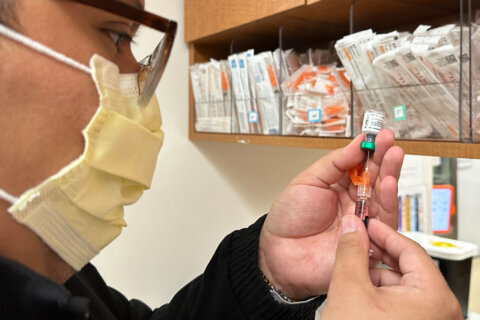Whether you’re about to start a weight-loss program or are having trouble shedding pounds, knowledge is power. Among the most important things to know: your levels of a few key health markers.
That’s because abnormalities can affect your ability to lose weight — either directly by altering your metabolic rate or by causing your energy levels and resolve to tank, says Dr. Spencer Nadolsky, a board-certified family and bariatric physician, diplomate of the American Board of Obesity Medicine and author of “The Fat Loss Prescription.”
So getting these levels tested and, ultimately, shoring up any issues can help you ensure you’re set up for weight-loss success. Keep in mind, though, that while most of these tests are routine, some insurance providers may not reimburse for others. Every company and physician is different in its practices, so it’s important to talk to your doctor if you have any concerns over what will and won’t be covered.
[See: The 10 Best Diets for Fast Weight Loss.]
1. Vitamin D
A full three-quarters of U.S. adults are deficient in the sunshine vitamin, according to research published in the Archives of Internal Medicine. “Vitamin D deficiency is so [prevalent] that I tell virtually all of my patients to take 2,000 to 4,000 IU per day,” Nadolsky says. Apart from contributing to a whole host of health conditions, low vitamin D levels can cause fatigue and mood disturbances, and are even linked to depression. “If people don’t feel well mentally or physically, they aren’t going to put their best foot forward,” he says. After all, people who report depressive symptoms are at an increased risk of weight gain and abdominal obesity in particular, according to research published in the American Journal of Public Health.
However, vitamin D may also affect your ability to lose weight even more directly. “This particular vitamin has hormonal functions and a vital impact on thyroid function,” explains Dr. Steven Wilson, a board-certified family medicine physician and diplomate of the American Board of Obesity Medicine at Redlands Community Hospital in California. Quick biology lesson: The active form of thyroid, called T3, is made from the less active form, T4. Vitamin D helps make that conversion happen.
If you are found to have low vitamin D levels (which is likely), your doctor may prescribe taking a D supplement. Eating D-rich foods like fortified milk, pork, fatty fish and mushrooms, as well as spending more time outdoors, can also help increase your vitamin D levels.
2. Thyroid Stimulating Hormone
Your thyroid, a small, butterfly-shaped gland situated in your neck, is in charge of producing two hormones: T3 and T4. Together, they help to set your basal metabolic rate — the number of calories you burn each day just to stay alive. However, underactive thyroids are both common and under-diagnosed. About 5 out of every 100 people suffer from hypothyroidism, a condition in which the thyroid gland does not produce enough thyroid hormones, according to research published in Endocrine Practice. Weight gain and difficulty losing weight are common side effects.
“Thyroid stimulating hormone, also called TSH, is a great screening tool for evaluating thyroid function. If that value is abnormal, then further testing should include free T3, free T4 and thyroid antibodies,” says Wilson, noting that in cases of hypothyroidism, medication can help promote metabolic health and, thus, weight loss.
[See: 15 Best Weight-Loss Diets at a Glance.]
3. Iron
This mineral is critical to your body’s ability to produce hemoglobin and therefore deliver oxygen throughout your body. Sub-par levels not only cause energy levels to plummet (no exercise to hit the gym or cook dinner?), they are linked to poor thyroid function, according to a 2016 study published in Thyroid Research. And, as we just covered, a shoddy thyroid can make losing weight exceedingly difficult.
In the U.S., approximately 10 million people are iron deficient, according to the National Institutes of Health. A large chunk of them are women of childbearing age (iron is lost each month during menstruation) and/or vegetarians or vegans (meat, poultry, eggs and dairy are among the best sources of iron). If you’re in one of these groups or just feel perpetually “run down,” it’s a good idea to have your iron levels checked. Supplementation can help get your levels where they need to be.
4. Fasting Blood Sugar
“About 9 out of 10 of my patients have detectable signs of insulin resistance,” Nadolsky says. In insulin resistance, the body cannot properly manage carbohydrates. Levels of glucose (aka sugar) in the blood become excessively high, and the body’s tendency to store fat, especially around the waist, increases.
[See: 10 Diets That Help Prevent or Manage Diabetes.]
A fasting blood sugar test, which is routinely included in comprehensive blood panels, is a great first sign of insulin resistance, Wilson says. (If your test results show excessive blood sugar levels, your doctor will likely follow up with an A1C test, which provides information on how your blood sugar levels have fluctuated over the past three months.)
If you do have insulin resistance, prediabetes or Type 2 diabetes, talking to your doctor or a certified diabetes educator to develop a low-carbohydrate eating strategy that works for you is vital to your ability to lose weight — and do so in a healthy way. Also, while not intended for weight loss, many medications prescribed for the management of diabetes often contribute to improved body composition.
More from U.S. News
These Books Can Actually Transform Your Health
7 Diet Mistakes Sabotaging Your Weight Loss
4 Levels You Need to Get Checked to Lose Weight originally appeared on usnews.com







